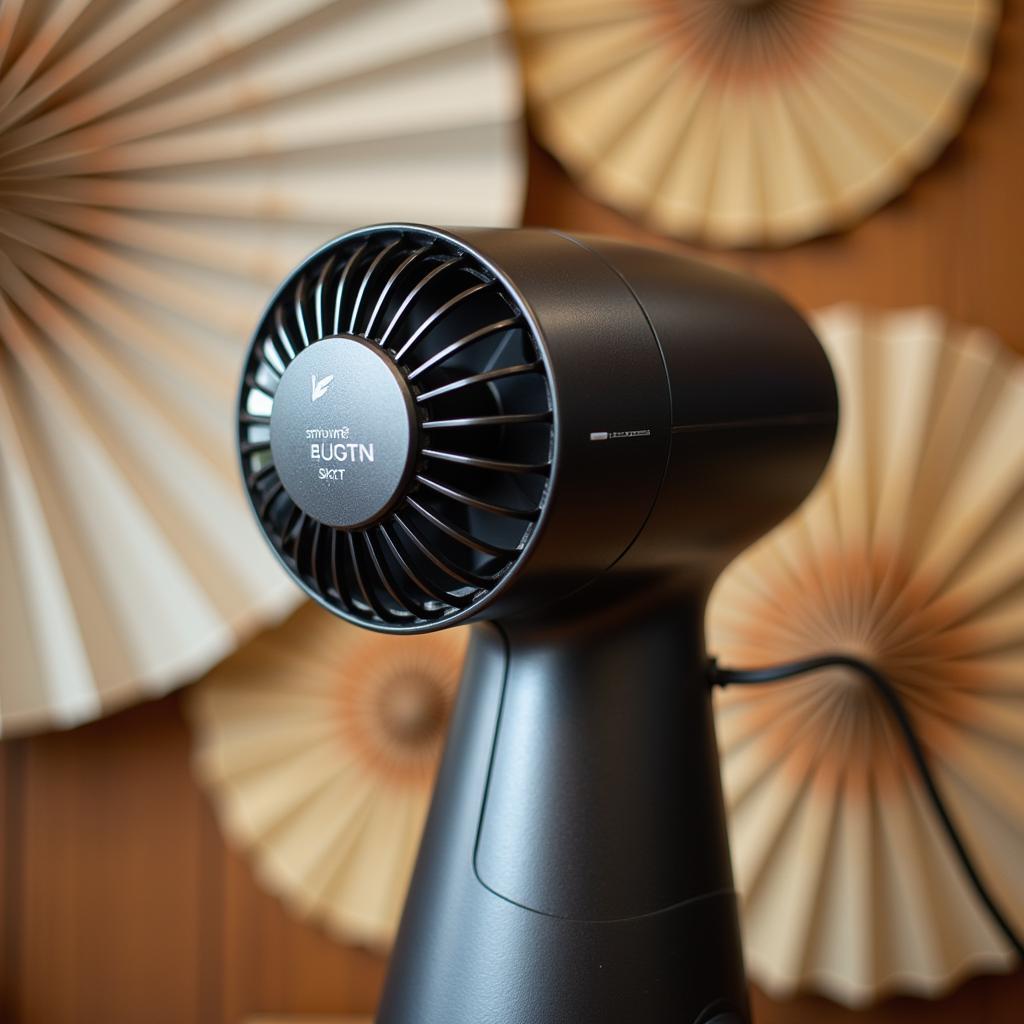Electric fans are an indispensable part of modern life, especially in countries with hot and humid climates like Japan. Whether you are planning a trip to Japan or simply curious about Japanese culture, understanding how to say and refer to “electric fan” in Japanese can be surprisingly useful.
This guide will delve into the various ways to say “electric fan” in Japanese, explore the cultural significance of these cooling devices, and provide you with some helpful vocabulary for navigating the world of Japanese fans.
The Japanese Word for Electric Fan: More Than Just a Translation
The most common way to say “electric fan” in Japanese is “扇風機 (senpūki)”. This word is composed of three kanji characters:
- 扇 (sen): This character represents a folding fan, a traditional Japanese hand-held fan.
- 風 (pū): This character means “wind.”
- 機 (ki): This character refers to a “machine” or “device.”
Therefore, “senpūki” literally translates to “wind-creating machine,” which accurately describes the function of an electric fan.
 Traditional Japanese Electric Fan
Traditional Japanese Electric Fan
Other Ways to Say “Electric Fan” in Japanese
While “senpūki” is the standard term, there are other ways to refer to electric fans in Japanese, depending on the context:
- ファン (fan): This is simply the English word “fan” adopted into Japanese. It’s commonly used in casual conversations and marketing materials.
- 扇風器 (senpūki): This is another way to write “electric fan,” though it’s less common than “扇風機.”
- 団扇 (uchiwa): This refers specifically to a round, non-folding fan, often made of paper or bamboo. While not technically an electric fan, understanding this term can be helpful when discussing traditional Japanese fans.
Electric Fans in Japanese Culture
Japan has a long history of using fans for both practical and ceremonial purposes. Traditional fans like the “uchiwa” and the folding “sensu” have been essential for centuries, playing roles in art, dance, and everyday life.
 Electric Fans at a Japanese Summer Festival
Electric Fans at a Japanese Summer Festival
With the advent of electricity, electric fans seamlessly integrated into Japanese homes and businesses. Today, they are ubiquitous during the hot and humid summers, providing much-needed relief from the heat.
Choosing the Right Word: Context is Key
When talking about “electric fans” in Japanese, the most appropriate term depends on the context:
- Formal situations: Use “扇風機 (senpūki)”.
- Casual conversations: “ファン (fan)” or “扇風機 (senpūki)” are both acceptable.
- When discussing traditional fans: Use “団扇 (uchiwa)” or “扇子 (sensu)” as appropriate.
Conclusion: Staying Cool with Japanese Vocabulary
Understanding how to say “electric fan” in Japanese – “扇風機 (senpūki)” – can be incredibly useful, whether you are planning a trip to Japan or simply expanding your Japanese vocabulary.
 Japanese Family Enjoying the Breeze from an Electric Fan
Japanese Family Enjoying the Breeze from an Electric Fan
This guide has provided you with a deeper understanding of this everyday appliance’s cultural significance and linguistic nuances. So, the next time you encounter an “electric fan” in a Japanese context, you’ll be well-equipped to navigate the conversation.
FAQs about Electric Fans in Japan
1. Are electric fans commonly used in Japan?
Yes, electric fans are extremely common in Japan, especially during the hot and humid summer months.
2. What types of electric fans are popular in Japan?
Japanese households commonly use various electric fans, including tower fans, desk fans, and wall-mounted fans. Energy-efficient DC motor fans are gaining popularity for their quiet operation and lower energy consumption.
3. Where can I buy an electric fan in Japan?
Electric fans are widely available in Japan. You can find them at electronics stores, department stores, home centers, and even convenience stores, especially during the summer.
4. Are electric fans expensive in Japan?
The price of an electric fan in Japan varies depending on the type, brand, and features. You can find affordable basic models for under ¥2,000 and high-end models with advanced features for over ¥10,000.
5. Do Japanese people use air conditioning or electric fans more often?
While air conditioning is increasingly common, many Japanese households still rely heavily on electric fans, especially during the early summer months or when trying to save energy.
For more insights into Japanese culture and language, check out these articles:
Need help finding the perfect “electric fan” for your needs in Japan?
Contact us at:
Phone Number: 0903426737
Email: fansbongda@gmail.com
Address: Tổ 9, Khu 6, Phường Giếng Đáy, Thành Phố Hạ Long, Giếng Đáy, Hạ Long, Quảng Ninh, Việt Nam.
Our 24/7 customer service team is here to assist you.


